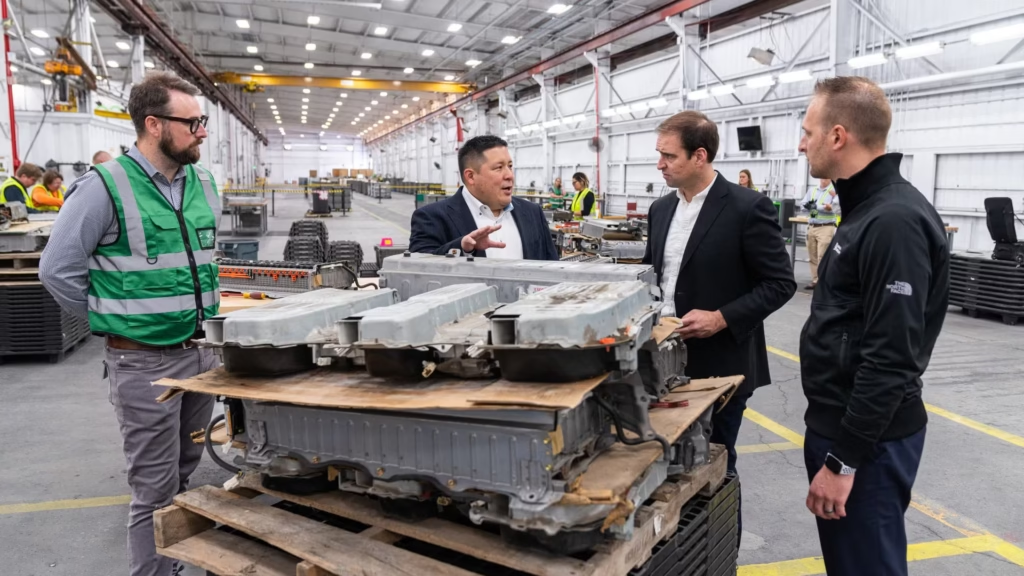For years, electric vehicles (EVs) have been hailed as the future of transportation. But Japan may have just rewritten that future. At a recent auto tech showcase in Tokyo, Toyota unveiled a new type of engine that runs on multi-fuel options, including hydrogen, bioethanol, and synthetic fuels and could challenge the very foundation of battery-powered cars like those made by Tesla.
According to Toyota’s Chief Technology Officer Hiroki Nakajima, the new engine is “completely different” from traditional internal combustion engines. It’s smaller, lighter, and designed to work alongside electric motors in hybrid systems. That means it can deliver high performance while cutting emissions, without relying on lithium-ion batteries.

This innovation comes at a time when EV makers are facing tough questions about battery production. Mining for lithium and other rare materials is expensive and harmful to the environment. As Grada3 reports, Toyota’s new engine uses carbon-neutral synthetic fuels, which can be stored and transported easily, making them more practical than hydrogen or batteries.
The engine was tested in real-world conditions during the Super Taikyu Fuji 24-Hour Race, where Toyota’s liquid hydrogen-powered GR Corolla showed improved performance and faster refueling times. While there were still some technical hiccups, engineers say the design is evolving quickly.
But Toyota isn’t going it alone. Japanese automakers Subaru and Mazda have joined forces with Toyota to develop eco-friendly engines that meet future emissions standards. This partnership, highlighted by Toyota Times, shows a united front in Japan’s push for cleaner combustion technology.
The new engine also supports hybrid integration, meaning it can work with electric motors to reduce emissions and improve torque. As EcoPortal explains, this could be a game-changer for countries with limited EV infrastructure. Refueling takes minutes, not hours, and the engine can run on multiple fuel types depending on what’s available.
So what does this mean for Tesla? While the American EV giant has dominated the battery-powered market, Japan’s multi-fuel engine could offer a more flexible and sustainable alternative. Tesla’s reliance on lithium-ion batteries, which are costly and environmentally taxing, may soon look outdated if Toyota’s strategy gains traction.
According to EcoNoticias, Toyota’s approach is not just about technology. It’s about adapting to global energy needs and offering solutions that work in different regions. That includes places where battery charging stations are rare or unreliable.
In short, Japan isn’t trying to catch up to Tesla it’s trying to leap ahead. With a new engine that blends tradition with innovation, Toyota and its partners are betting big on a future where combustion and clean energy coexist. And if they’re right, the battery-powered dream may soon need a reboot.
Toyota’s solid-state battery breakthrough

While Toyota’s new multi-fuel engine is grabbing headlines, the company is also making waves in battery innovation. According to Electrek, Toyota plans to launch solid-state EV batteries with up to 750 miles of range and 10-minute fast charging. These batteries are lighter, safer, and more durable than current lithium-ion models. If successful, they could reshape the EV market or even complement Toyota’s new engine strategy by offering hybrid systems with solid-state storage.
Environmental impact and global strategy
Toyota’s new engine isn’t just about performance, it’s about sustainability. As noted by Sustainability Times, the engine can run on carbon-neutral fuels like ammonia and synthetic hydrocarbons, reducing reliance on lithium mining and cutting emissions. This approach could be especially useful in regions where EV infrastructure is limited. Toyota’s multi-pathway strategy which includes hydrogen, hybrids, and now multi-fuel engines ,allows it to adapt to different markets and energy landscapes.
What This Means for the Auto Industry
Toyota’s move could spark a shift in how automakers think about clean mobility. Instead of betting everything on batteries, companies may explore alternative fuels, hybrid systems, and engine redesigns to meet climate goals. As Motor1 reports, Toyota’s new engines are smaller, lighter, and more efficient and could be used in everything from compact cars to SUVs. If adopted widely, this could lead to cleaner combustion without sacrificing driving range or refueling speed.




